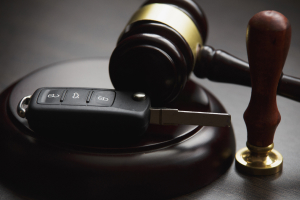
Navigating the aftermath of a car accident can be complex and stressful. Understanding California car accident laws can help you make informed decisions about your legal rights and options.
We are Omofoma Law and are here to represent car accident victims following a serious car crash. Learn more about how a California personal injury lawyer from our law firm can help you, and contact us to discuss filing a claim with your car insurance company or a personal injury lawsuit.
There are a lot of specific laws that come into play regarding not only who California Highway Patrol or a law enforcement officer decides is at fault for the accident but also how damages might be awarded. Some of the specifics to keep in mind include:
California follows the principle of comparative negligence in car accident cases. Under this system, each party's liability is based on their percentage of fault in causing the accident (California Civil Code 1714). Even if you are partially at fault, you can still seek compensation. However, your compensation will be reduced by your percentage of fault.
In California, you generally have two years to file a claim from the date of the accident (California Code of Civil Procedure 335.1). You could lose your right to pursue compensation if you miss this deadline.
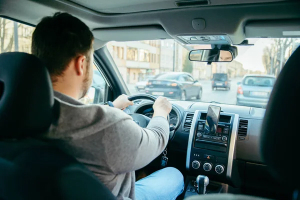
Liability in car accidents refers to who is legally responsible for the damages caused by the collision. In California, liability is primarily determined based on the concept of "negligence" or "fault." Here's a closer look at the various aspects involved in determining liability:
Negligence refers to a lack of care on the roads compared to that of a typical driver. The concept of negligence is pivotal in determining fault in car accident cases. It is dictated by principal such as duty of care, breach of duty, causation, and damages.
While establishing negligence, courts consider several factors:
Third-party accounts of the accident can be instrumental in establishing fault. Law enforcement officers who respond to the scene compile a report detailing the accident. This report can include the officer's observations, statements from those involved and witnesses, diagrams of the scene, and sometimes even the officer's opinion on who was at fault.
In addition, witnesses can provide an objective perspective of the accident, helping to corroborate or refute statements by the involved parties. Their testimonies can be crucial evidence in court.
California follows the "pure comparative negligence" rule. This means if you're found partially at fault for the accident, your compensation will be reduced proportionately.
If both parties share fault, each party's compensation will be reduced by their percentage of fault. For instance, if you were 20% at fault, you could recover 80% of your damages.
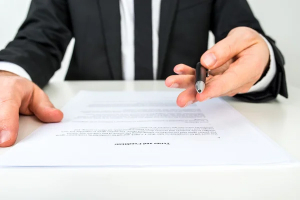
Following a car accident, California law requires certain reporting and insurance obligations.
California law requires you to report a car accident to the police if it results in an injury, a fatality, or damage to property exceeding $1,000 (California Vehicle Code 16000).
You must also report a car accident to the DMV within ten days if it results in injury, death, or property damage exceeding $1,000 (California Vehicle Code 16000).
California requires drivers to carry a minimum amount of liability insurance to cover damages caused by car accidents. The minimum requirements are $15,000 for injury or death to one person, $30,000 for injury or death to more than one person, and $5,000 for property damage (California Vehicle Code 16056).
Certain scenarios necessitate special considerations under California car accident laws:
If you're involved in an accident with a government vehicle, the claim filing process differs and generally has a shorter timeline. You typically have six months from the date of the accident to file a claim (California Government Code 911.2).
Accidents involving commercial vehicles can be complex due to the potential involvement of various parties, including drivers, vehicle owners, and employers. Multiple parties could be held liable, including the company that performs maintenance, the company that manufactured the vehicle, and the company responsible for hiring the driver. We will conduct a full investigation to ensure that anyone liable is held responsible.
If you're involved in an accident with an uninsured or underinsured driver, your own insurance policy may cover your losses, depending on its terms. It depends on the specific nature of your insurance policy, so take a closer look at your policy and reach out to your insurance company if you have any questions.
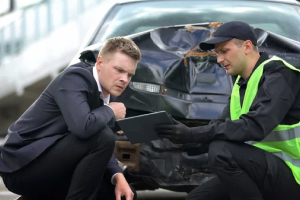
Car accidents are stressful and often traumatic. However, your actions in the immediate aftermath can significantly impact your ability to claim compensation later on. If you find yourself involved in a car accident in California, it's crucial to follow these steps:
Your first and foremost concern should be the safety and well-being of all involved parties.
Evidence collected from the accident scene can significantly strengthen your claim. When safe to do so:
Promptly reporting the accident to your insurance company is critical.
In cases involving serious injuries, significant property damage, or complex legal issues, it's wise to seek legal counsel.
Remember, the immediate aftermath of an accident can be overwhelming, but taking these steps can protect your rights and provide a foundation for a successful claim if necessary.
When pursuing compensation in a car accident case, the aim is to make the injured party 'whole' again or restore them as closely as possible to their state before the accident.
Damages, the legal term for the money awarded to the injured party, fall broadly into three categories: economic damages, non-economic damages, and punitive damages. Each category serves a unique purpose and covers different types of losses.
Economic damages compensate for financial losses directly resulting from the accident. They're quantifiable and are typically substantiated by bills, receipts, and wage statements. Economic damages include:
Non-economic damages are awarded for non-tangible, often subjective, losses from the accident. They're harder to quantify than economic damages but are nonetheless important. Non-economic damages may cover the following:
These damages aren't typically awarded to compensate for a loss. Instead, they're designed to punish the at-fault party for particularly reckless or malicious behavior and deter others from similar conduct. Punitive damages are not awarded in every case and are typically reserved for situations where the defendant's actions were egregiously negligent or intentionally harmful.
In California, punitive damages are governed by Civil Code section 3294, which allows punitive damages "for the sake of example and by way of punishing the defendant." The decision to award punitive damages and the amount to award is at the jury's discretion.
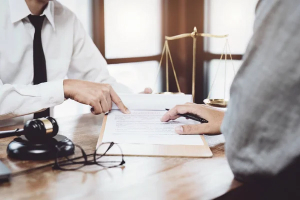
Car accidents often result in a whirlwind of chaos and confusion. Hiring a skilled car accident lawyer can provide much-needed clarity and peace of mind. They're experienced in handling these types of cases and can navigate the complex legal landscape on your behalf. Here are some specific ways a California car accident lawyer can assist you:
Remember, an experienced car accident lawyer is your advocate. Their goal is to help you secure the compensation you deserve while allowing you to focus on your recovery.
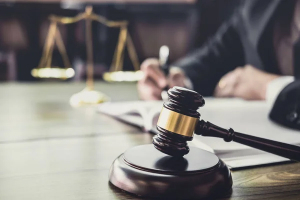
If you're involved in a car accident, contact Omofoma Law to schedule an initial consultation. We'll guide you through the complex legal landscape, providing compassionate and effective legal representation every step of the way.
Give us a call today.


Request Your
Free Consultation
"*" indicates required fields